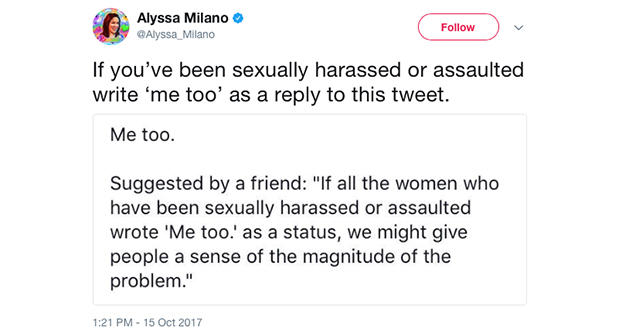Sexual assault and harassment did not start, and likely will not end, in Hollywood.
After allegations of decades of sexual assault by movie mogul Harvey Weinstein came to light by a New York Times article on Oct. 5, the hashtag #MeToo began trending on social media. The response grew when actress Alyssa Milano asked for victims of sexual assault and harassment to reply to her tweet with “Me too.”
The tweet, by Tuesday, had received more than 61,000 replies, 22,000 retweets and more than 41,000 likes. It has caught the attention of people from all walks of life. It has Fresno State staff hoping larger awareness is created for sexual assault.
Erin Boele, the interim Title IX coordinator at Fresno State, said she believes these types of movements help victims speak out about their experiences.
“I do believe that movements like this help others speak out as it can help remove the silence that has encapsulated these topics and again allow them to know that they are not alone and others understand what they are going through,” Boele said.
She added that meaningful conversations about sexual assault and harassment will create more awareness. “The more aware people are, the more effective we can be with change,” Boele said.
According to the 2017 Annual Security Report published by the university police, no rapes were reported on campus last year. But one rape was reported in 2015 and in 2014. Three fondling cases were reported last year on campus and once at a campus residence, according to the same report.
Out of every sixth American women, one has been raped or has been a victim of an attempted rape, according to data gathered by Rape, Abuse & Incest National Network (RAINN).
As of 1988 in the U.S., the organization reports 17.7 million women have become victims of rape. As for men, 2.78 million have become victims of rape, according to RAINN.
With the staggering numbers, it’s likely there are those in the Fresno State community who have experienced sexual assault.
The Collegian reached out to students on social media and asked those who attend, work or have graduated from Fresno State to reply with “Me too” if they have been affected by sexual assault at any moment in their life.
Twelve users affiliated with Fresno State responded publicly, and two responded through a direct message.
Mercedes Martinez, a history major at Fresno State, said she has always considered herself a victim of sexual assault, until recently.
Now, “I am a survivor,” she said.
Martinez said she first heard of the “#MeToo” campaign when a friend of her’s posted about it on a Facebook. Then, she said, the movement began to grow, and she saw it everywhere online.
“I am deeply invested in this movement,” Martinez said. “We’ve grown up in a culture where we just don’t talk about sexual assault, so we don’t really know just how common it is.”
For seven years, Martinez said, she has kept the secret of being sexually assaulted to herself. She said it’s something she has been ashamed of.
“To see these strong, powerful women speaking out about their own assaults, and to see how far they’ve moved away from it, it’s inspiring,” she said.
Despite how uncomfortable a conversation about sexual assault may be, Martinez said, it’s something society needs to begin talking about.
She hopes the “#MeToo” campaign gives men and women the courage to come forward and fight against sexual assault and harassment.
“We need to find the strength to stop it from happening to someone else,” according to Martinez.
Although movements like this can have a positive effect, Boele, Title IX coordinator, said it can also trigger discomfort for some. She recommended people be careful when having conversations about such a topic.
“We need to talk about what is happening in our society but also be mindful that conversations [or] remarks can trigger individuals in a variety of ways,” Boele said.
Bree Godoy, a student assistant majoring in public health and women’s studies and also a victim advocate intern at the Student Health and Counseling Center, said the movement may help students open up about their experience because, often, a conversation can reduce the stigma surrounding sexual assault and harassment.
Lisa Risch, who is the university’s only victim advocate, is on leave throughout the remainder of the semester. The health center has partnered with local advocacy groups such as Rape Counseling Services (RCS) and the Marjaree Mason Center.
To contact a university victim advocate, call 559-278-6796 or email confidentially at [email protected]. To contact the Title IX coordinator, call 559-278-2345. For more resources, visit the university’s “confidential advocacy services” webpage.




